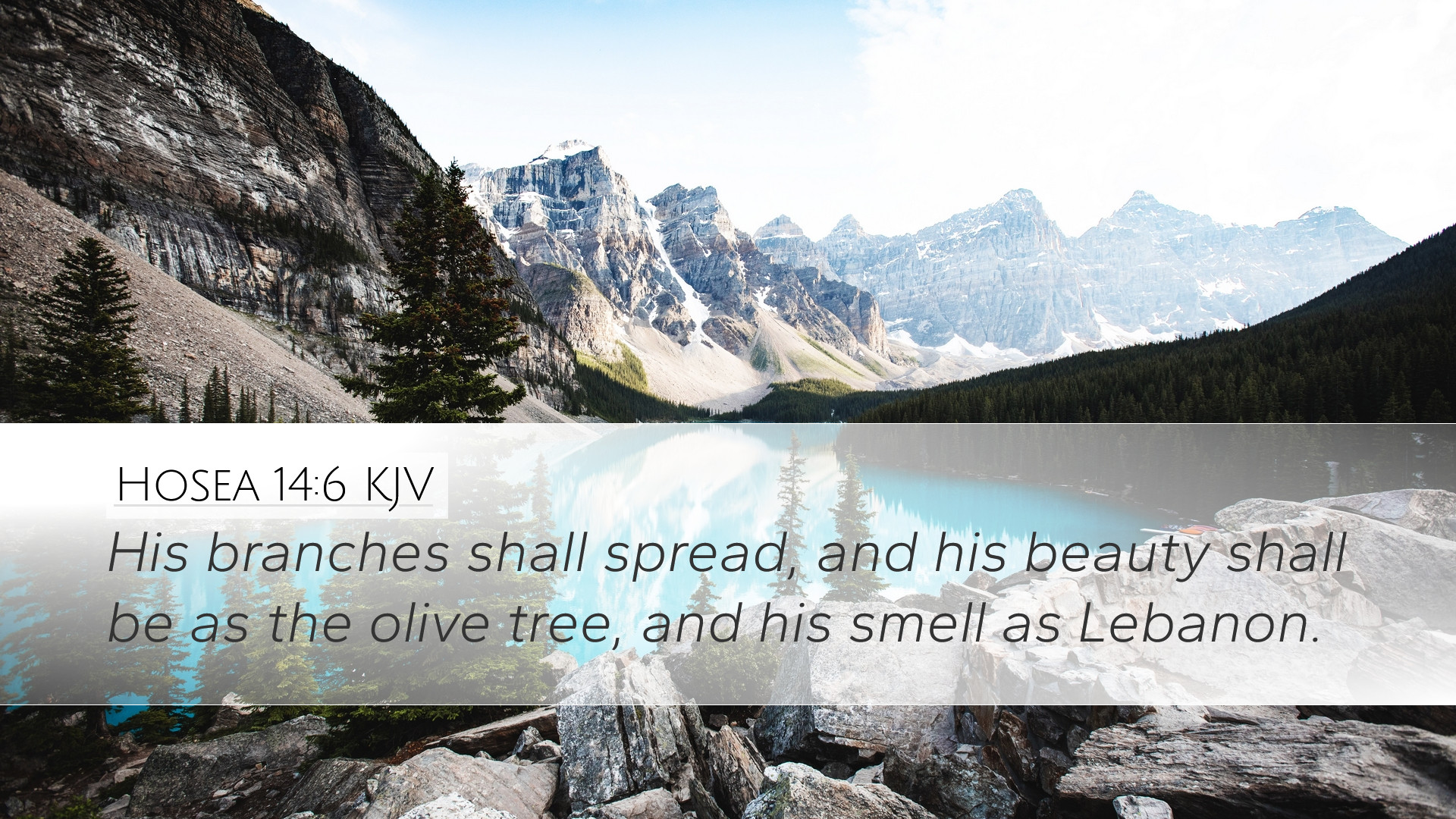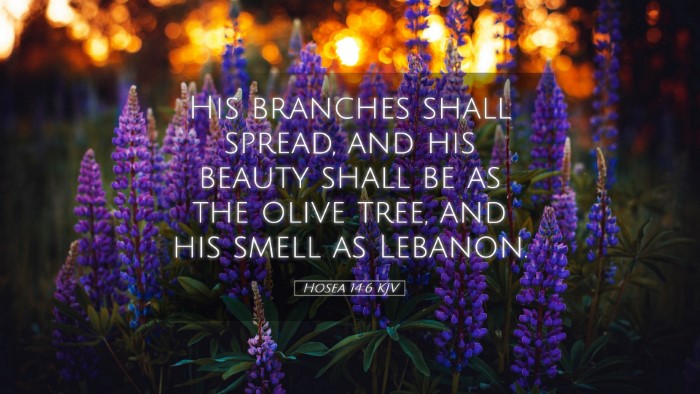Old Testament
Genesis Exodus Leviticus Numbers Deuteronomy Joshua Judges Ruth 1 Samuel 2 Samuel 1 Kings 2 Kings 1 Chronicles 2 Chronicles Ezra Nehemiah Esther Job Psalms Proverbs Ecclesiastes Song of Solomon Isaiah Jeremiah Lamentations Ezekiel Daniel Hosea Joel Amos Obadiah Jonah Micah Nahum Habakkuk Zephaniah Haggai Zechariah MalachiHosea 14:6
Hosea 14:6 KJV
His branches shall spread, and his beauty shall be as the olive tree, and his smell as Lebanon.
Hosea 14:6 Bible Commentary
Commentary on Hosea 14:6
Verse: Hosea 14:6 - "His branches shall spread, and his beauty shall be as the olive tree, and his smell as Lebanon."
Introduction
The prophetic book of Hosea captures the profound love of God amidst the backdrop of Israel's spiritual infidelity. Chapter 14 serves as a climactic conclusion to the book, offering hope for restoration. In particular, verse 6 presents a rich metaphor—depicting Israel as a flourishing tree in its renewal. Insights from prominent public domain commentators will be explored to provide a more profound understanding of this verse.
Historical Context
Hosea prophesied during a tumultuous period for Israel, characterized by idolatry, social injustice, and moral decay. The northern kingdom was facing impending judgment while Hosea's ministry aimed to turn hearts back to God. The agricultural imagery in verse 6 resonates deeply in an agrarian society, symbolizing prosperity, vitality, and divine favor.
Exploration of Imagery
In this verse, several powerful symbols emerge, primarily the olive tree and the fragrance of Lebanon. Each aspect warrants examination:
- Olive Tree: The olive tree is a potent symbol of fruitfulness, longevity, and peace. Matthew Henry notes that the olive tree can thrive even in rocky soil, representing the resilience of the faithful in Israel.
- Branches: The spreading branches signify growth and expansion. Adam Clarke emphasizes that as Israel returns to God, they will experience an abundance of blessings, manifesting in both spiritual and material realms.
- Beauty: The beauty of the olive tree reflects the splendor of a life devoted to God. Albert Barnes articulates this beauty as a divine ornament, highlighting that true beauty is found in righteousness and faithfulness.
- Fragrance of Lebanon: Lebanon is known for its majestic cedar trees, associated with strength and durability. The fragrance imagery suggests an aura of holiness and divine favor that will be upon God's people once they repent and turn toward Him.
Theological Significance
This verse is not merely descriptive but carries deep theological implications relevant for understanding God’s character and His relationship with Israel:
- God's Desire for Restoration: The overarching theme in Hosea is God's relentless pursuit of His people. The metaphor of flourishing branches indicates that despite past unfaithfulness, God’s desire is for healing and restoration.
- Transformation through Repentance: Restoration is contingent upon repentance. The image of beauty portrays how genuine repentance leads to transformative grace, allowing Israel to reclaim their identity as God’s chosen people.
Practical Applications
This verse provides insightful applications for contemporary believers:
- Spiritual Renewal: Just as Israel was called to return to the Lord, believers today are repeatedly invited to engage in personal renewal through repentance and embracing God’s grace.
- Living Out Divine Beauty: Christians are called to manifest the beauty of holiness in their lives. This entails loving righteousness, exhibiting godly character, and representing Christ in their conduct.
- Encouragement in Growth: Believers are reminded that spiritual growth may not always be immediately visible, but with faithfulness, God nurtures and develops His people for His glory.
Conclusion
Hosea 14:6 serves as a profound reminder of God’s faithfulness and the hope of transformation for His people. The olive tree and the fragrance of Lebanon beautifully illustrate the restoration that awaits those who turn to God in repentance. Through the insights provided by esteemed commentators, we see a multifaceted understanding of this verse, encouraging pastors, students, and all believers to embrace the call to spiritual vitality and divine beauty.


